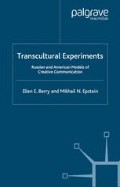Abstract
The transcultural project emerged in the society with the highest level of social determinism. The Marxist idea that social existence determines social consciousness and in the final analysis individual consciousness, and Lenin’s idea that one cannot live in a society and be free from the society, were the governing assumptions of Soviet ideology. Since Soviet society was so persistently and forcefully homogenized it was impossible for any social group to challenge the foundations of the society or to oppose itself to the society as a whole. As a result, the project of transculture from its conception aimed to activate the transsocial potentials inherent in human individuals rather than those oppositional or revolutionary elements pertaining to specific social groups.
Access this chapter
Tax calculation will be finalised at checkout
Purchases are for personal use only
Preview
Unable to display preview. Download preview PDF.
Notes
Alfred Schutz, Collected Papers, II, Studies in Social Theory, ed. and intro. by Arvid Brodersen (The Hague: Martinus Nijhoff, 1964): 104.
Fredric Jameson, Postmodernism, or The Cultural Logic of Late Capitalism (Durham: Duke University Press, 1993): 4, 36.
“Today everyday, political, social, historical, economic, etc., reality has already incorporated the hyperrealist dimension of simulation… Reality has passed completely into the game of reality… The consummate enjoyment [jouissance] of the signs of guilt, despair, violence and death are replacing guilt, despair and even death in the total euphoria of simulation”—such is a typical postmodern discourse on the death of reality as instigated by Jean Baudrillard in Symbolic Exchange and Death (1976), trans. Iain H. Grant (London: Sage, 1993): 74.
Copyright information
© 1999 Ellen E. Berry, Mikhail N. Epstein
About this chapter
Cite this chapter
Epstein, M. (1999). Transculture and Society. In: Transcultural Experiments. Palgrave Macmillan, New York. https://doi.org/10.1057/9780312299712_7
Download citation
DOI: https://doi.org/10.1057/9780312299712_7
Publisher Name: Palgrave Macmillan, New York
Print ISBN: 978-1-349-42157-2
Online ISBN: 978-0-312-29971-2
eBook Packages: Palgrave Social & Cultural Studies CollectionSocial Sciences (R0)

